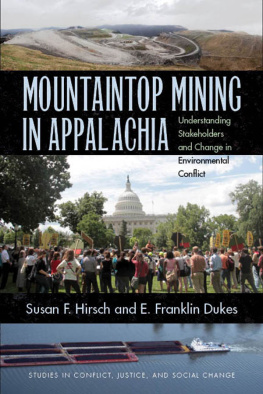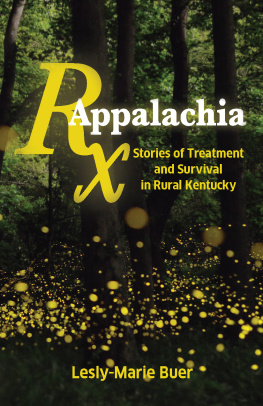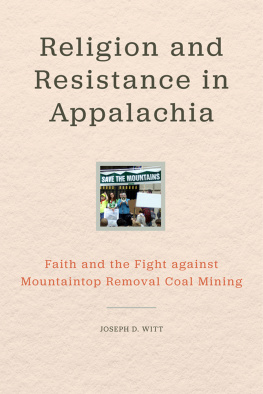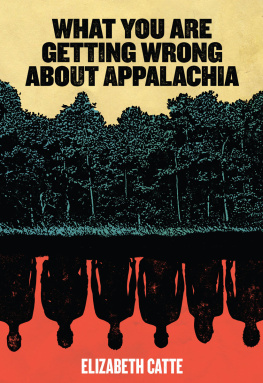Out of the Mountains
OHIO UNIVERSITY PRESS
SERIES IN RACE, ETHNICITY, AND GENDER IN APPALACHIA
Series Editor: Marie Tedesco
Memphis Tennessee Garrison
The Remarkable Story of a Black Appalachian Woman
edited by Ancella R. Bickley and Lynda Ann Ewen
The Tangled Roots of Feminism, Environmentalism, and Appalachian Literature
by Elizabeth S. D. Engelhardt
Red, White, Black, and Blue
A Dual Memoir of Race and Class in Appalachia
by William R. Drennen Jr. and Kojo (William T.) Jones Jr., edited by Dolores M. Johnson
Beyond Hill and Hollow
Original Readings in Appalachian Womens Studies
edited by Elizabeth S. D. Engelhardt
Loving Mountains, Loving Men
by Jeff Mann
Power in the Blood
A Family Narrative
by Linda Tate
Out of the Mountains
Appalachian Stories
by Meredith Sue Willis
Out of the Mountains
Appalachian Stories
Meredith Sue Willis
Ohio University Press
Athens
Other Books by Meredith Sue Willis
Stories and Novels for Adults
Oradell at Sea
The City Built of Starships
Dwights House and Other Stories
In the Mountains of America
Trespassers
Only Great Changes
Higher Ground
A Space Apart
Quilt Pieces (with Jane Wilson Joyce)
Novels for Children
Billie of Fish House Lane
Marcos Monster
The Secret Super Powers of Marco
Nonfiction about Writing
Ten Strategies to Write a Novel
Personal Fiction Writing
Deep Revision
Blazing Pencils
Ohio University Press, Athens, Ohio 45701
www.ohioswallow.com
2010 by Ohio University Press
All rights reserved
To obtain permission to quote, reprint, or otherwise reproduce or distribute material from Ohio University Press publications, please contact our rights and permissions department at (740) 593-1154 or (740) 593-4536 (fax).
Printed in the United States of America
Ohio University Press books are printed on acid-free paper
18 17 16 15 14 13 12 11 10 5 4 3 2 1
Library of Congress Cataloging-in-Publication Data
Willis, Meredith Sue.
Out of the mountains : Appalachian stories / Meredith Sue Willis.
p. cm. (Series in race, ethnicity, and gender in Appalachia)
ISBN 978-0-8214-19 19-9 (alk. paper) ISBN 978-0-8214-1920-$ (pb : alk. paper) ISBN 978-0-8214-4331-6 (electronic)
1. Short stories, American. 2. Appalachian RegionSocial life and customsFiction. 3. City and town lifeFiction. 4. Mountain lifeFiction. I. Title.
PS3573.I45655O88 2010
813'.54.dc22
2010004382
These stories are dedicated to children with roots in the mountains
those who know it, and those who dont.
Contents
Acknowledgments
Big Boss Is Back appeared previously in Appalachian Heritage: A LiteraryMagazine of the Southern Appalachians (Fall 2002). It won the Denny C. Plattner Short Story Prize.
Elvissa and the Rabbi was published as Elvissa Did Not Become a Rabbi in Kimera: Journal of Fine Writing 5 (Fall 2000), and in the online version of Kimera (August 2000).
Evenings with Dotson appeared as Evenings with Porter in the PikevilleReview (Spring 1988), where it won the Pikeville Review Fiction Prize, and in In the Mountains of America (Mercury House, 1994).
The Little Harlots appeared in Antietam Reviewi 1 (Spring 1991 ) and in Inthe Mountains of America (Mercury House, 1994).
Nineteen Sixty-Nine appeared as 1969 in the online journal SaltRiver Review (Fall 2000), http://www.mc.maricopa.edu/users/cervantes/srr/SRR9/willis.html.
On the Road with C. T. Savage was first published in AppalachianHeritage: A Literary Magazine of the Southern Appalachians 34, no. 4 (Fall 2006).
A substantially different version of material in Scandalous Roy Critchfield appeared in We All Live Downstream, edited by Jason Howard (Louisville, KY: Motes Books, 2009).
Speak Well of the Dead appeared in Now and Then 8, no. 1 (Spring 1991 ) and in In the Mountains of America (Mercury House, 1994).
Tara White was first published in the 2009 issue of Bloodroot LiteraryMagazine.
Triangulation appeared first in Saranac Review (Winter 2007), Department of English, SUNY Plattsburgh.
I am deeply grateful to the following people who, among others, gave me critical help with these stories: Carol Emshwiller, Shelley Ettinger, Edith Konecky, Joan Leibovitz, Suzanne McConnell, Carole Rosenthal, Andrew B. Weinberger, David Weinberger, and Christine Willis.
Triangulation
There is a process in navigation by which you locate an unknown point by forming a triangle between itwhere you are standing now, for exampleand two known points. From time to time, we use great events in history in this way. That was the year I got married and also the year of the great blackout. Where were you when the president was shot? When the towers fell?
The great events, the bombings and genocides, the assassinations and scandals in high places, tend to frighten us with our smallness, our vulnerability. We strain to regain equilibrium, some of us through prayer, some through political action, some by withdrawing to family or a circle of friends. Yet we are all always a part of it. It was history that drove people out of Northern Ireland to take their chances in the Appalachian Mountains of America. History that gave them the upper hand over those who had previously used those lands.
History and chance.
I imagine that the survival of my precise genetic material was ensured by a series of accidents: the dead branch of an old oak tree that fell and missed a man who was clearing fields for plowingand he was one of my ancestors. A midwife who once washed her hands in cold water and homemade lye soapand thus a woman and baby survived who were also my ancestors.
My father was discharged from the army for bad eyesight just before they changed the medical standards, and thus spent the Second World War in Akron, Ohio, working in an airplane factory rather than dying on the beaches at Normandy before I could be conceived. Behind him, in the mountains, the farmer who dodged the branch, the midwife with clean hands.
My fathers fathers family were short, dark people who didnt keep a family tree and were perhaps part Melungeon, the southern mountain mixed-race group. My fathers mothers family were lighter-colored, large people from long-established families in Lee County, Virginia. They were educated by the standards of the day, and it is said that my grandmothers mother rode a horse, and that this demonstrated her pridefulness, and since pride goeth before a fall, it was no surprise to anyone when her husband ran off with the hired girl.
The children were divided over whose fault this was: my grandmothers brothers said he was driven to it by her gentility, but my grandmothers older sister blamed him. My grandmother herself, the baby girl, had been the delinquents favorite and the playmate of the teenaged hired girl. She was crushed to lose them, and, as she got older, to know that her familys business was talked about by people up and down the Powell Valley. Her mother eventually remarried a roughhewn Mr. McPhee, and my grandmother had to share a bed with his large and not always clean daughters.









